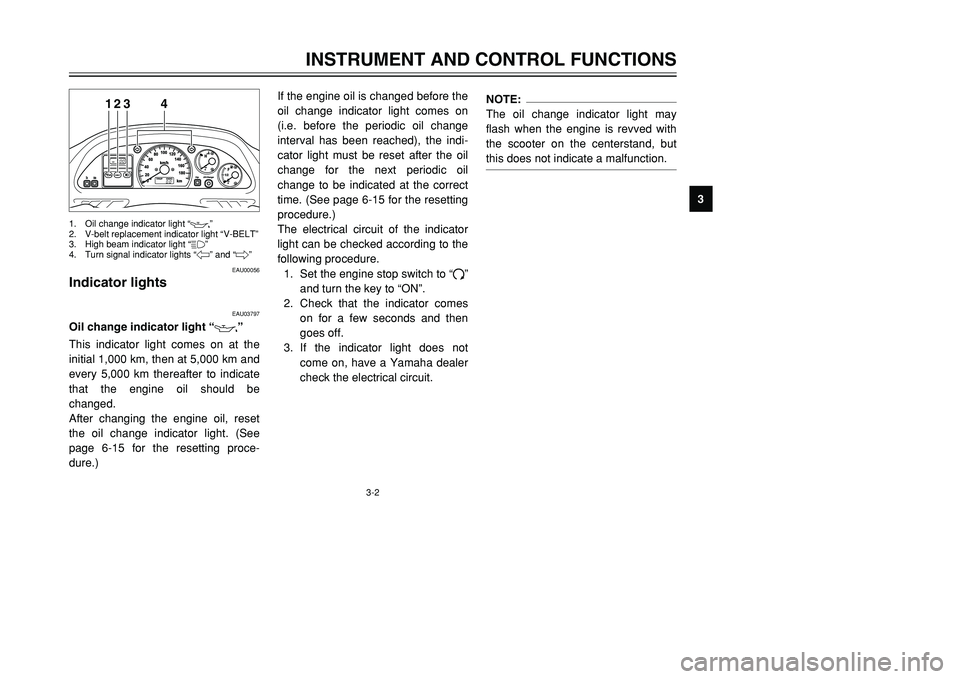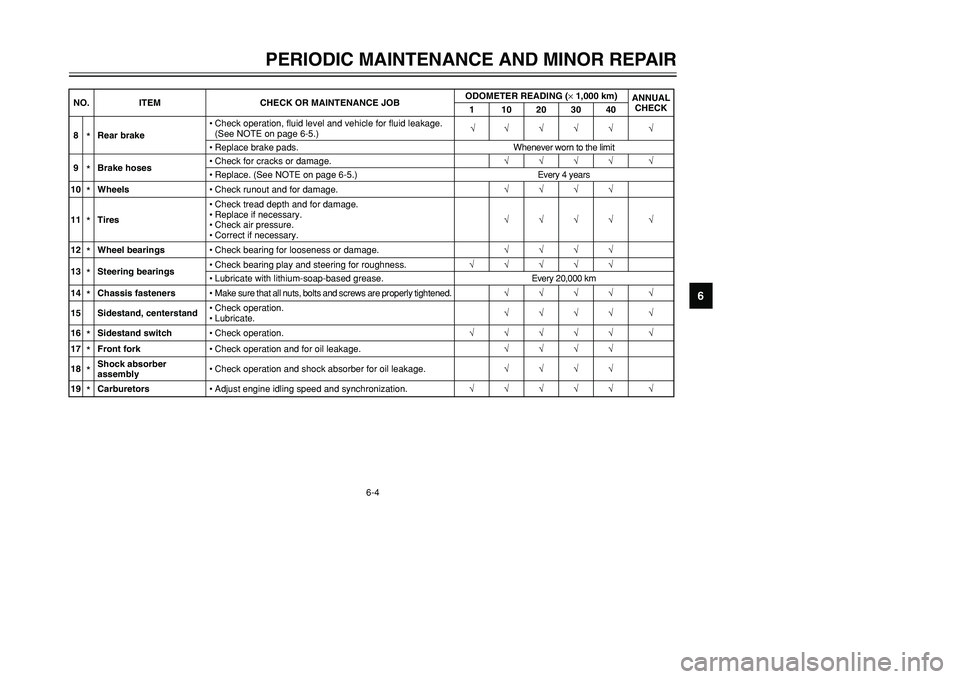2002 YAMAHA TMAX engine oil
[x] Cancel search: engine oilPage 13 of 102

2-1
EAU00026
DESCRIPTIONPart locations
2
1. Fuel tank cap (page 3-9)
2. Rear storage compartment (page 3-14)
3. Helmet holder (page 3-13)
4. Grab bar (page 5-2)
5. Chain drive oil filler cap (page 6-15)
6. Engine oil filler cap (page 6-13)7. V-belt air filter element (left)
8. Engine oil drain bolt (page 6-13)
9. Engine oil level check window (page 6-12)
10. Oil filter cartridge (page 6-13)
1
2
3
4
9
8
7
6
5
10
Left view
5GJ-9-E1 9/4/01 1:27 PM Page 12
Page 18 of 102

3-2
INSTRUMENT AND CONTROL FUNCTIONS
3
EAU00056
Indicator lightsIndicator lights
EAU03797
Oil change indicator light “
7
”
Oil change indicator lightThis indicator light comes on at the
initial 1,000 km, then at 5,000 km and
every 5,000 km thereafter to indicate
that the engine oil should be
changed.
After changing the engine oil, reset
the oil change indicator light. (See
page 6-15 for the resetting proce-
dure.)If the engine oil is changed before the
oil change indicator light comes on
(i.e. before the periodic oil change
interval has been reached), the indi-
cator light must be reset after the oil
change for the next periodic oil
change to be indicated at the correct
time. (See page 6-15 for the resetting
procedure.)
The electrical circuit of the indicator
light can be checked according to the
following procedure.
1. Set the engine stop switch to “#”
and turn the key to “ON”.
2. Check that the indicator comes
on for a few seconds and then
goes off.
3. If the indicator light does not
come on, have a Yamaha dealer
check the electrical circuit.
NOTE:
The oil change indicator light may
flash when the engine is revved with
the scooter on the centerstand, but
this does not indicate a malfunction.
123
4
1. Oil change indicator light “
7
”
2. V-belt replacement indicator light “V-BELT”
3. High beam indicator light “&”
4. Turn signal indicator lights “4” and “6”
5GJ-9-E1 9/4/01 1:27 PM Page 17
Page 19 of 102

3-3
EAU04424
V-belt replacement indicator light
“V-BELT”V-belt replacement indicator lightThis indicator light comes on every
20,000 km when the V-belt needs to
be replaced.
The electrical circuit of the indicator
light can be checked according to the
following procedure.
1. Turn the key to “ON” and make
sure that the engine stop switch
is set to “#”.
2. If the indicator light does not
come on, have a Yamaha dealer
check the electrical circuit.
EAU00063
High beam indicator light “&”High beam indicator lightThis indicator light comes on when
the high beam of the headlight is
switched on.
EAU04121
Turn signal indicator lights “4”
and “6”Turn signal indicator lightsThe corresponding indicator light
flashes when the turn signal switch is
pushed to the left or right.
INSTRUMENT AND CONTROL FUNCTIONS
3
123
4
1. Oil change indicator light “
7
”
2. V-belt replacement indicator light “V-BELT”
3. High beam indicator light “&”
4. Turn signal indicator lights “4” and “6”
EAU04426
Speedometer unitSpeedometer unitThe speedometer unit is equipped
with a speedometer, an odometer
and a tripmeter. The speedometer
shows riding speed. The odometer
shows the total distance traveled.
The tripmeter shows the distance
traveled since it was last set to zero.
Pushing the “Trip” button switches
the display between the odometer
mode “ODO” and the tripmeter mode
“TRIP”. To reset the tripmeter, enter
the “TRIP” mode, and then hold down
123
1. Speedometer
2. Odometer/tripmeter
3.“Trip” button
5GJ-9-E1 9/4/01 1:27 PM Page 18
Page 21 of 102

3-5
EAU04402
ClockClockThe digital clock shows the time
regardless of the main switch posi-
tion.
To set the clock:
1. Push or hold the hour setting
button “h” to change the hours.
2. Push or hold the minute setting
button “m” to change the min-
utes.
NOTE:
To set the clock after the power
source has been cut, first set the time
to 1:00 AM, and then set the clock to
the correct time.
EAU03840
Self-diagnosis deviceSelf-diagnosis deviceThis model is equipped with a self-
diagnosis device for the throttle posi-
tion sensor, the speed sensor, and
the overturn switch. If any of those
circuits are defective, the oil change
indicator light will flash.
If the indicator light flashes, have a
Yamaha dealer check the scooter as
soon as possible.NOTE:
The oil change indicator light may
flash when the engine is revved with
the scooter on the centerstand, but
this does not indicate a malfunction.
INSTRUMENT AND CONTROL FUNCTIONS
3
1 23
1. Digital clock
2. Hour setting button “h”
3. Minute setting button “m”
5GJ-9-E1 9/4/01 1:27 PM Page 20
Page 35 of 102

4-1
EAU01114
PRE-OPERATION CHECKS
4The condition of a vehicle is the owner’s responsibility. Vital components can start to deteriorate quickly and unexpect-
edly, even if the vehicle remains unused (for example, as a result of exposure to the elements). Any damage, fluid leak-
age or loss of tire air pressure could have serious consequences. Therefore, it is very important, in addition to a thor-
ough visual inspection, to check the following points before each ride.
EAU03439
Pre-operation check list
Pre-operation check list
ITEM CHECKS PAGE
Fuel•Check fuel level in fuel tank.
•Refuel if necessary.
•Check fuel line for leakage.3-9–3-11
Engine oil•Check oil level in engine.
•If necessary, add recommended oil to specified level.
•Check vehicle for oil leakage.6-12–6-15
Coolant•Check coolant level in reservoir.
•If necessary, add recommended coolant to specified level.
•Check cooling system for leakage.6-17–6-18
Front brake•Check operation.
•If soft or spongy, have Yamaha dealer bleed hydraulic system.
•Check fluid level in reservoir.
•If necessary, add recommended brake fluid to specified level.
•Check hydraulic system for leakage.3-9, 6-25–6-28
Rear brake•Check operation.
•If soft or spongy, have Yamaha dealer bleed hydraulic system.
•Check fluid level in reservoir.
•If necessary, add recommended brake fluid to specified level.
•Check hydraulic system for leakage.3-9, 6-25–6-28
5GJ-9-E1 9/4/01 1:27 PM Page 34
Page 42 of 102

5-4
OPERATION AND IMPORTANT RIDING POINTS
5
EAU01128
Engine break-inEngine break-inThere is never a more important peri-
od in the life of your engine than the
period between 0 and 1,600 km. For
this reason, you should read the fol-
lowing material carefully.
Since the engine is brand new, do
not put an excessive load on it for the
first 1,600 km. The various parts in
the engine wear and polish them-
selves to the correct operating clear-
ances. During this period, prolonged
full-throttle operation or any condition
that might result in engine overheat-
ing must be avoided.
EAU03845
0–1,000 km
Avoid prolonged operation above 1/3
throttle.
1,000–1,600 km
Avoid prolonged operation above 1/2
throttle.
ECA00080
cCAfter 1,000 km of operation, the
engine oil must be changed, and
the oil filter cartridge replaced.1,600 km and beyond
The vehicle can now be operated
normally.
EC000049
cCIf any engine trouble should occur
during the engine break-in period,
immediately have a Yamaha dealer
check the vehicle.
EAU00460
ParkingParkingWhen parking, stop the engine, and
then remove the key from the main
switch.
EW000058
w8Since the engine and exhaust
system can become very hot,
park in a place where pedestri-
ans or children are not likely
to touch them.
8Do not park on a slope or on
soft ground, otherwise the
scooter may overturn.
5GJ-9-E1 9/4/01 1:27 PM Page 41
Page 44 of 102

PERIODIC MAINTENANCE AND MINOR REPAIR
Owner’s tool kit ..................................................... 6-1
Periodic maintenance and lubrication chart .......... 6-3
Removing and installing cowlings and panels ...... 6-6
Checking the spark plugs ..................................... 6-9
Engine oil and oil filter cartridge .......................... 6-12
Chain drive oil ..................................................... 6-15
Coolant ............................................................... 6-17
Cleaning the air filter element ............................. 6-19
Adjusting the carburetors .................................... 6-21
Adjusting the engine idling speed ....................... 6-21
Adjusting the throttle cable free play ................... 6-22
Adjusting the valve clearance ............................. 6-22
Tires .................................................................... 6-23
Cast wheels ........................................................ 6-25
Front and rear brake levers ................................ 6-25
Checking the front and rear brake pads ............. 6-26
Checking the brake fluid level ............................. 6-27
Changing the brake fluid ..................................... 6-28
Checking and lubricating the throttle grip
and cable .......................................................... 6-29
Lubricating the front and rear brake levers ......... 6-29
Checking and lubricating the centerstand and
sidestand .......................................................... 6-29
Checking the front fork ........................................ 6-30Checking the steering ......................................... 6-31
Checking the wheel bearings .............................. 6-31
Battery ................................................................ 6-32
Replacing the fuses ............................................ 6-34
Replacing a headlight bulb ................................. 6-35
Troubleshooting .................................................. 6-36
Troubleshooting charts ....................................... 6-37
6
5GJ-9-E1 9/4/01 1:27 PM Page 43
Page 48 of 102

6-4
PERIODIC MAINTENANCE AND MINOR REPAIR
6
8
*Rear brake•Check operation, fluid level and vehicle for fluid leakage.
(See NOTE on page 6-5.)√√√√√ √
•Replace brake pads.Whenever worn to the limit
9*Brake hoses•Check for cracks or damage.√√√√ √
•Replace. (See NOTE on page 6-5.)Every 4 years
10*Wheels•Check runout and for damage.√√√√
11*Tires•Check tread depth and for damage.
•Replace if necessary.
•Check air pressure.
•Correct if necessary.√√√√ √
12*Wheel bearings•Check bearing for looseness or damage.√√√√
13*Steering bearings•Check bearing play and steering for roughness.√√√√√
•Lubricate with lithium-soap-based grease.Every 20,000 km
14*Chassis fasteners•Make sure that all nuts, bolts and screws are properly tightened.√√√√ √
15 Sidestand, centerstand•Check operation.
•Lubricate.√√√√ √
16*Sidestand switch•Check operation.√√√√√ √
17*Front fork•Check operation and for oil leakage.√√√√
18*Shock absorber
assembly•Check operation and shock absorber for oil leakage.√√√√
19*Carburetors•Adjust engine idling speed and synchronization.√√√√√ √ NO. ITEM CHECK OR MAINTENANCE JOBODOMETER READING (× 1,000 km)
ANNUAL
CHECK
1 10203040
5GJ-9-E1 9/4/01 1:27 PM Page 47